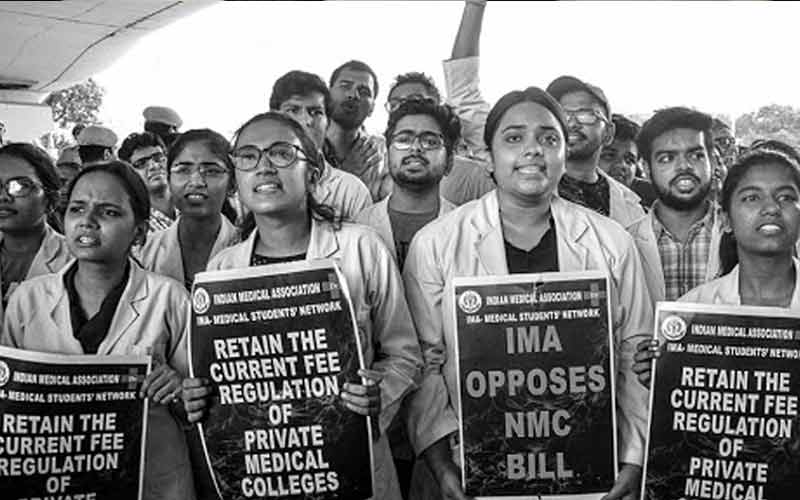Medical students and junior doctors in Vizag continued to stage hunger strike in Visakhapatnam against NMC (National Medical Commission) Bill. Consequently, the number of inpatients at KGH, Govt ENT and CHEST hospitals has significantly reduced as the doctors have boycotted their duties and only emergency surgeries are being attended.
The protest started on Monday, 5 August 2019, at Gandhi statue near the GVMC administrative building, Visakhapatnam by Andhra Pradesh Junior Doctors Association (APJUDA), Students Federation of India (SFI), medical aspirants and doctors from RIMS Srikakulam, Gayatri Medical College, and NRI Medical College.
Reportedly, the admission of patients in KGH, which used to be around 1700, has now gone down to 1200. Also, 150 to 200 surgeries were performed daily, while the recent trends register just 50 on average. With junior doctors in Vizag participating in the protest, assistant and associate professors are taking up their duties.
Similar scenes are being observed at the Govt. ENT and CHEST hospitals, where the doctors are having a tough time attending the inpatients.
About National Medical Commission (NMC) Bill
The Rajya Sabha passed the NMC Bill with two new amendments on 31 July 2019. The Bill focuses on replacing the corruption-plagued Medical Council of India (MCI) with NMC, which will be responsible for approving and assessing medical colleges, conducting exams and regulating fees.
Also, final-year MBBS exam, called Nation Exit Test (NEXT) will be implemented in the next 3 years, which needs to be cleared to practise medicine, for admissions in medical courses and enrolment in the State Register or the National Register. Students completing their degree from foreign countries will be required to take NEXT to legally practise medicine in India.
In spite of the Government passing the new NMC Bill with amendments on 31 July 2019, the medical fraternity isn’t too pleased with it. The protestors have claimed that the Bill had no mention of the community health providers and alleged additional burden with the new test. Doctors have also found fault with increasing the number of seats in the private sector and thereby reducing the same in the government sector.










Discussion about this post